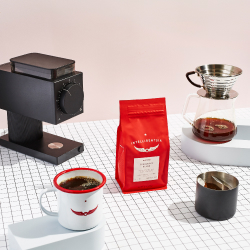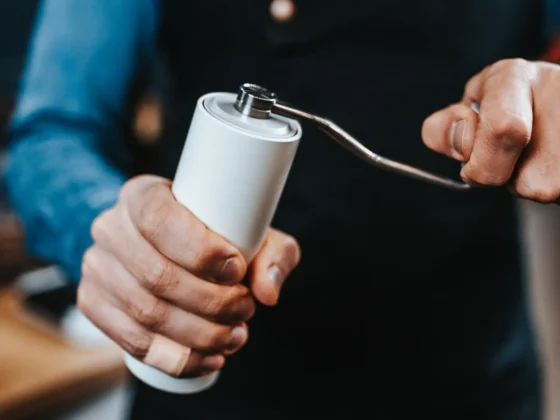In the world of caffeinated beverages, coffee stands as a ubiquitous choice for millions. Yet, as the aroma of a freshly brewed cup wafts through our homes and offices, few of us contemplate the journey those beans have taken to reach our mugs. The path to creating a delightful cup of coffee involves numerous stages and countless hands. It’s a journey that raises critical questions about the sustainability of our coffee consumption habits and the impact they have on our planet. This article, ‘Sustainable Coffee: A Comprehensive Guide to Ethical and Eco-Friendly Practices’, aims to shed light on these pertinent issues, offering readers a robust understanding of what goes into producing a sustainable cup of coffee.
In recent years, a new movement has been brewing—pun intended. A collective of conscientious coffee lovers, farmers, and businesses have been pouring their efforts into fostering more ethical and eco-friendly practices within the coffee industry. These pioneers have given rise to sustainable coffee brands, businesses that prioritize not only the quality of their coffee but also the health of our planet and the well-being of coffee farmers around the globe.
As we delve deeper into the world of sustainable coffee, we’ll explore the different practices that constitute ‘sustainability’ in this context, the challenges faced in maintaining these practices, and the benefits that arise when we choose to support these coffee brands. This comprehensive guide will enable you, the coffee enthusiast, to make more informed choices about the coffee you consume, knowing that your love for this popular beverage is also contributing positively to our world.
Sit back, grab your favorite cup of joe, and join us as we embark on a journey through the sustainable coffee landscape—a journey that promises to be as enlightening as it is enriching.
Sustainable Coffee: Key Takeaway
- The Journey of Coffee: Understanding the journey of coffee from bean to brew is crucial in making informed choices about our coffee consumption. This journey includes the coffee growing process, the role of fair trade in coffee production, and the environmental impact of coffee production.
- Benefits of Sustainable Coffee: Choosing sustainable coffee has numerous benefits, including environmental, social, and economic advantages for coffee farmers, as well as health benefits for consumers.
- Identifying Sustainable Coffee: Knowing how to identify sustainable coffee is key. Consumers should look for trusted certifications, consider the packaging, and understand how to interpret coffee labels to make the best choices.
- Sustainable Coffee Brands: Several brands are leading the way in ethical and eco-friendly practices. Supporting these brands can contribute to a more sustainable coffee industry and a healthier planet.
- Brewing and Enjoying Sustainable Coffee at Home: Our choices at home also matter. From choosing eco-friendly brewing methods to storing coffee correctly and pairing it with sustainable food choices, every step contributes to creating a sustainable coffee culture.
The Journey of Coffee: From Bean to Brew
Coffee’s journey from a humble bean to the invigorating brew we enjoy is a story worth telling. It’s a process that involves countless individuals and countless decisions, each of which can impact the quality of the coffee and the sustainability of its production.
The Coffee Growing Process: An Overview
Coffee begins its life as a seed, planted in nutrient-rich soils within the region known as the ‘coffee belt’. This area, spanning the globe between the Tropics of Cancer and Capricorn, provides the ideal climate for coffee cultivation, with ample rainfall, warm temperatures, and specific altitude conditions that coffee plants favor. (1)
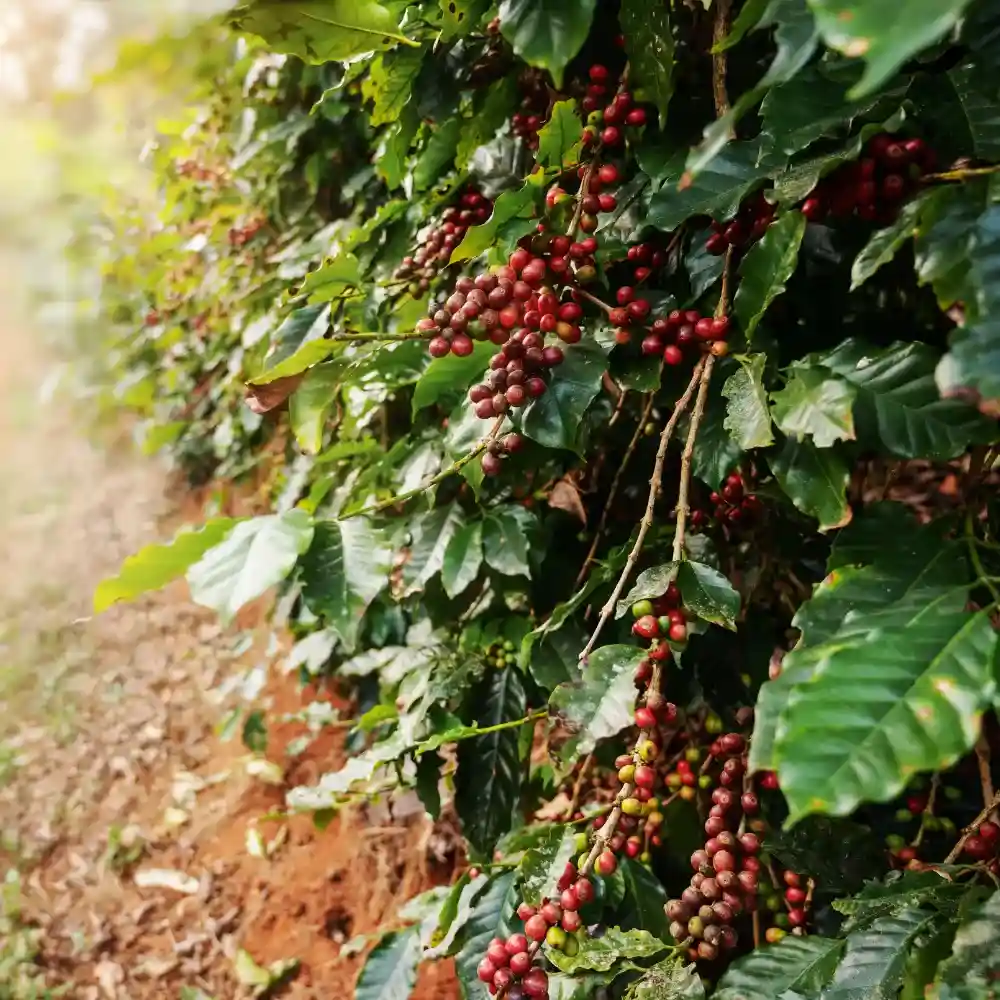
There are two main types of coffee beans: Arabica and Robusta. Arabica coffee beans, known for their refined flavor and aromatic qualities, are the preferred choice for many specialty and sustainable coffee brands. These beans are typically grown at higher elevations and require more precise care and attention during their growth process. (2)
After planting, coffee seeds take anywhere from 3-4 years to mature into a coffee tree capable of bearing fruit. The fruit, known as the coffee cherry, turns a bright, deep red when it’s ripe and ready for harvesting. This harvesting process can be labor-intensive, often requiring the manual collection of individual cherries. (3)
Once harvested, the coffee cherries must be processed to remove the outer pulp and reveal the coffee beans inside. The beans are then dried, sorted, and eventually roasted, transforming them into the aromatic beans that we know and love. This roasting process is where the flavors of the coffee are truly brought to life, and it’s a crucial stage in determining the final taste of your brew.
The Role of Fair Trade in Coffee Production
The journey of coffee is not just about the physical process of transforming beans into a brew. It’s also about the human component of this journey—the farmers who cultivate the crops, the workers who harvest them, and the communities that rely on coffee production for their livelihood.

This is where fair trade coffee comes into play. Fair trade practices aim to ensure equitable trade conditions for coffee farmers and workers, promoting sustainable farming methods, providing better prices for farmers, and improving working conditions. Fair trade certification serves as a guarantee that the coffee you’re buying has been produced in a way that is socially and economically fair. (4)
When you choose fair trade coffee, you’re making a choice that supports the well-being of the people who have worked to bring you your coffee. You’re also contributing to the longevity of quality coffee production, as these practices often involve sustainable farming methods that protect the environment and ensure the continued productivity of the land.
The Impact of Coffee Production on the Environment
Coffee production, like any agricultural process, has a significant impact on the environment. The cultivation of coffee requires land, water, and energy, and if not managed sustainably, can lead to deforestation, soil degradation, and water pollution.
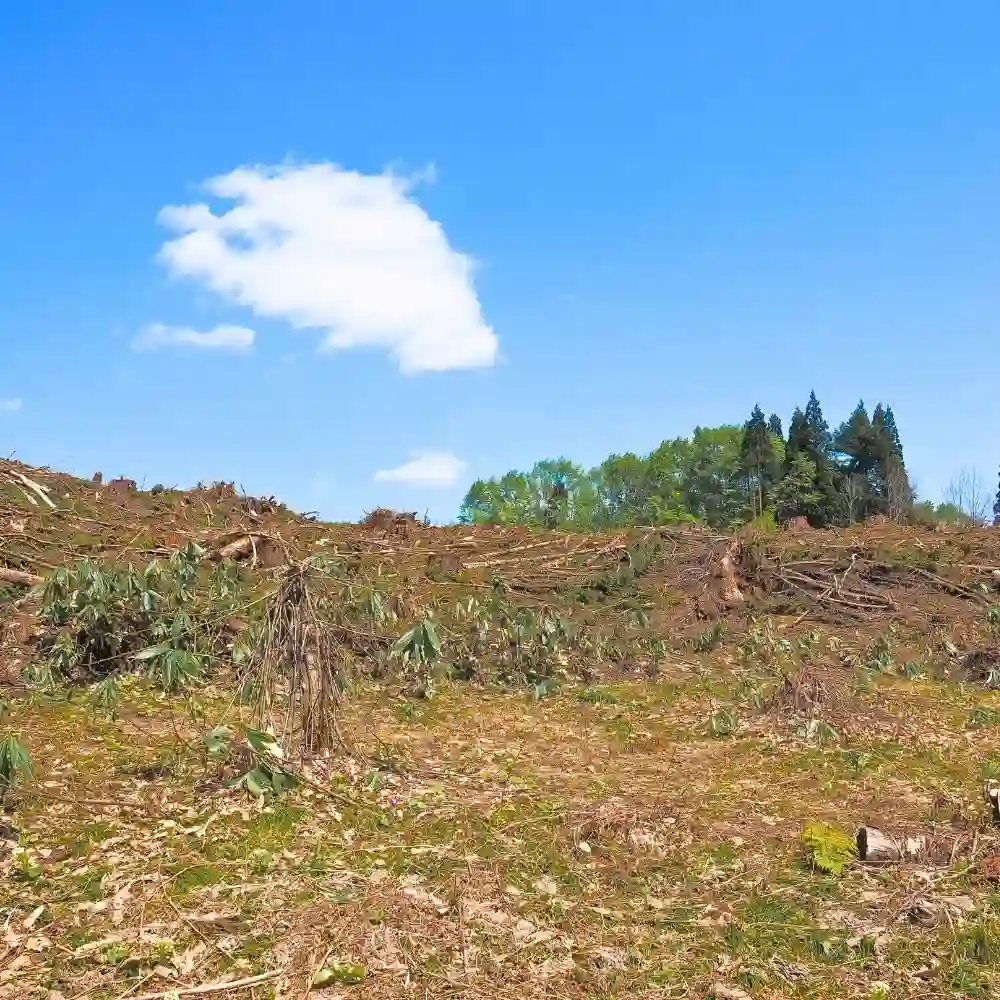
In traditional coffee farming, farmers often clear large tracts of land, leading to a loss of biodiversity and increased carbon emissions. Furthermore, the use of chemical fertilizers and pesticides can contaminate local water sources and harm the surrounding ecosystem. (5)
However, sustainable coffee brands are making strides to reduce the environmental impact of coffee production. These companies often prioritize organic farming methods, which minimize the use of harmful chemicals. They also support practices like shade-grown coffee, where coffee trees are grown under a canopy of larger trees. This method not only preserves local ecosystems and biodiversity but also improves the quality of the coffee, as shade-grown beans tend to develop slower and yield a richer flavor.
The journey of coffee from bean to brew is a complex one, involving many stages and many hands. By understanding this journey and the impacts it can have, we can make more informed choices about the coffee we consume. This, in turn, can help us support sustainable practices and fair trade policies that lead to a better world for everyone involved. From the coffee belt to your coffee cup, each step of the process matters. So, next time you savor a sip of your favorite brew, remember the journey it has taken and consider how your choices can contribute to a more sustainable and equitable coffee industry.
The Benefits of Choosing Sustainable Coffee
As the awareness around our environmental footprint grows, so too does the interest in sustainable products. Coffee, being one of the most traded commodities globally, has a significant impact on our planet and its people. Consequently, the benefits of choosing sustainable coffee extend far beyond the satisfying taste of your morning brew.
Environmental Benefits of Sustainable Coffee
Sustainable coffee farming practices are designed to minimize harm to the environment and promote biodiversity. Unlike conventional farming methods, sustainable practices avoid the use of harmful pesticides and synthetic fertilizers, thus preventing soil degradation and water contamination.

As discussed earlier, sustainable coffee farming often involves shade-grown methods, where coffee trees are grown under a canopy of larger trees. This process not only reduces deforestation but also promotes a healthier ecosystem by providing habitats for various bird species and other wildlife.
Sustainable coffee also addresses the issue of climate change. Coffee trees naturally sequester carbon dioxide, thereby reducing greenhouse gasses in the atmosphere. By choosing sustainable coffee, you’re supporting farming methods that conserve our natural resources and contribute to the overall health of our planet.
Social and Economic Benefits for Coffee Farmers
Sustainability in coffee production isn’t just about the environment; it’s also about the people involved in the process. This is where the concept of fair trade coffee plays a pivotal role.

As mentioned before, Fair trade practices ensure that coffee farmers receive a fair price for their crops, enabling them to cover production costs and maintain a decent standard of living. Moreover, fair trade cooperatives often invest in community development projects, contributing to the well-being of the entire community.
By choosing fair trade coffee, you’re not just buying a cup of coffee; you’re also contributing to social justice and economic equity in coffee-producing regions.
Health Benefits of Organic Coffee
When we talk about sustainable coffee, we often mention organic farming practices. The best organic coffee is grown without the use of synthetic pesticides and fertilizers, which is not only good for the environment but also beneficial for your health.

Pesticide residues can find their way into your cup of coffee, but by choosing organic, you significantly reduce your exposure to these potentially harmful substances. Additionally, organic coffee often contains a higher concentration of beneficial antioxidants compared to conventionally grown coffee. This can contribute to a healthier diet and may even reduce the risk of certain diseases.
To sum up, choosing sustainable coffee has numerous benefits. It supports the preservation of our environment, promotes social and economic fairness, and can contribute to a healthier lifestyle. By being mindful of our coffee choices, we can make a significant difference in our world—one cup at a time.
How to Identify Sustainable Coffee
As consumers, our buying decisions can play a significant role in promoting sustainable practices within the coffee industry. However, with so many brands on the market, it can be challenging to identify which ones truly prioritize sustainability. This section will guide you through the process of identifying sustainable coffee, from understanding certifications to recognizing eco-friendly packaging and deciphering coffee labels.
Certifications to Look for When Buying Coffee
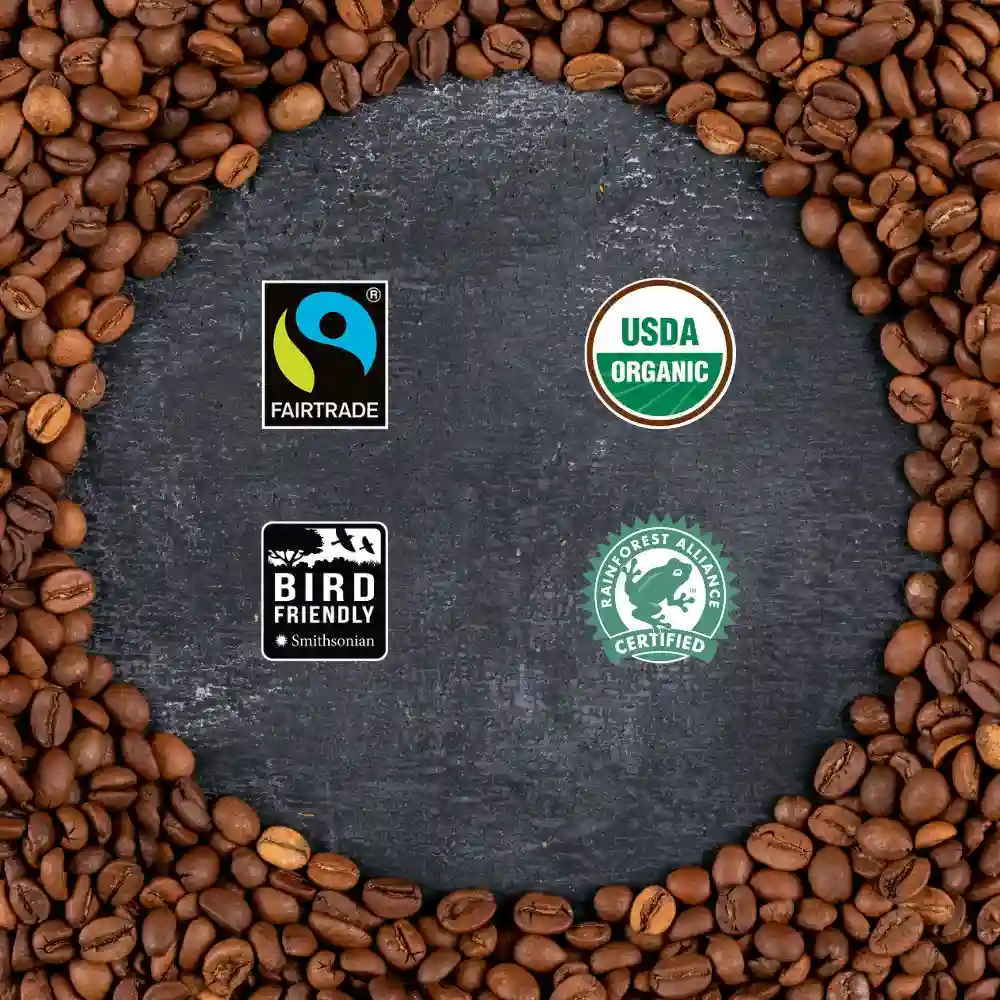
One of the easiest ways to identify sustainable coffee is by looking for certifications on the packaging. These labels are provided by independent organizations that verify the product meets certain environmental, social, or economic standards.
Here are some key certifications to look for:
- Fair Trade Certified: This certification ensures that farmers are paid fair prices for their crops and work under safe conditions. It also promotes sustainable farming practices.
- Organic Certified: This label is given to products grown without synthetic pesticides or fertilizers. In the United States, this certification is granted by the USDA. (6)
- Rainforest Alliance Certified: This certification guarantees that the coffee is grown using methods that support biodiversity and enhance soil health. It also ensures fair treatment and good working conditions for farmers and workers.
- Bird Friendly: This is a certification from the Smithsonian Migratory Bird Center, indicating that the coffee is shade-grown and organic, promoting bird habitats and biodiversity. Learn more about this type of certificate with our article on Bird-Friendly Coffee.
The Role of Packaging in Sustainable Coffee
Sustainable coffee brands often extend their commitment to the environment by using eco-friendly packaging. Look for brands that use packaging made from recycled materials or compostable materials. Some companies even offer reusable containers or refill programs to reduce waste.
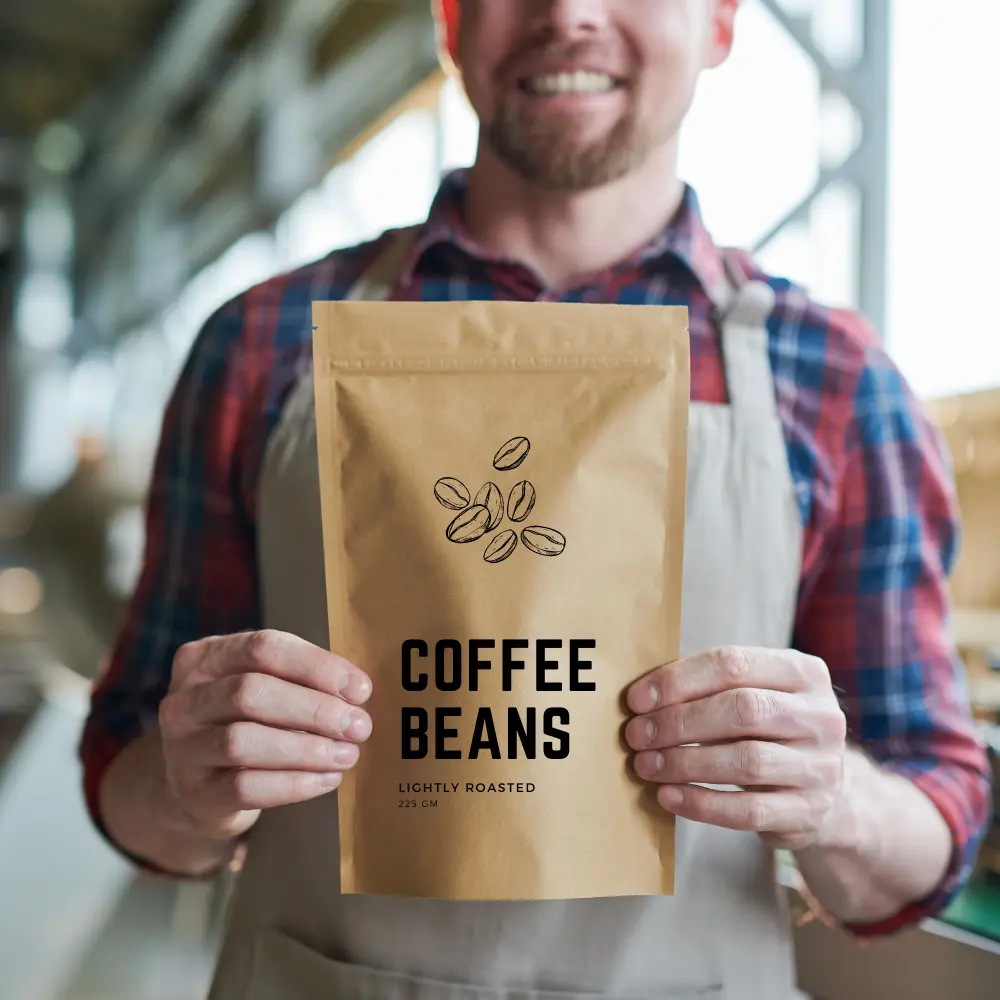
Remember, sustainable packaging isn’t just about the materials used but also about the life cycle of the packaging. Consider how you will dispose of the packaging once you’ve finished the coffee. Can it be recycled or composted in your local area? If not, you might want to look for a brand that offers a take-back program for its packaging.
Understanding Coffee Labels: What to Look For
Aside from certifications and packaging, understanding the information provided on coffee labels can also help you identify sustainable options. Here are a few things to look for:
- Origin: Knowing where your coffee comes from can give you some insight into its sustainability. Some regions are known for their sustainable farming practices.
- Variety: Some coffee varieties, like Arabica, are typically grown in higher altitudes and under shade, which can be more sustainable.
- Processing Method: Look for terms like ‘sun-dried,’ which are methods of processing coffee that use less water and energy compared to other methods.
- Roasting Date: Freshly roasted coffee not only tastes better but also requires less packaging and resources for preservation.
To sum up, identifying sustainable coffee requires a little bit of knowledge and attention to detail. By understanding certifications, considering packaging, and reading labels carefully, you can make coffee choices that align with your commitment to sustainability.
Brands Leading the Way in Sustainable Coffee
In a world where consumer choices can directly impact the health of the planet and the livelihoods of communities across the globe, it’s heartening to see brands that are actively striving to make a difference. This section will shine a spotlight on such pioneers in the coffee industry, demonstrating how their actions are shaping a more sustainable future for all.
A Spotlight on Ethical Coffee Brands
Among the leading lights in the realm of sustainable coffee are Larry’s Coffee and Ethical Bean.
Larry’s Coffee
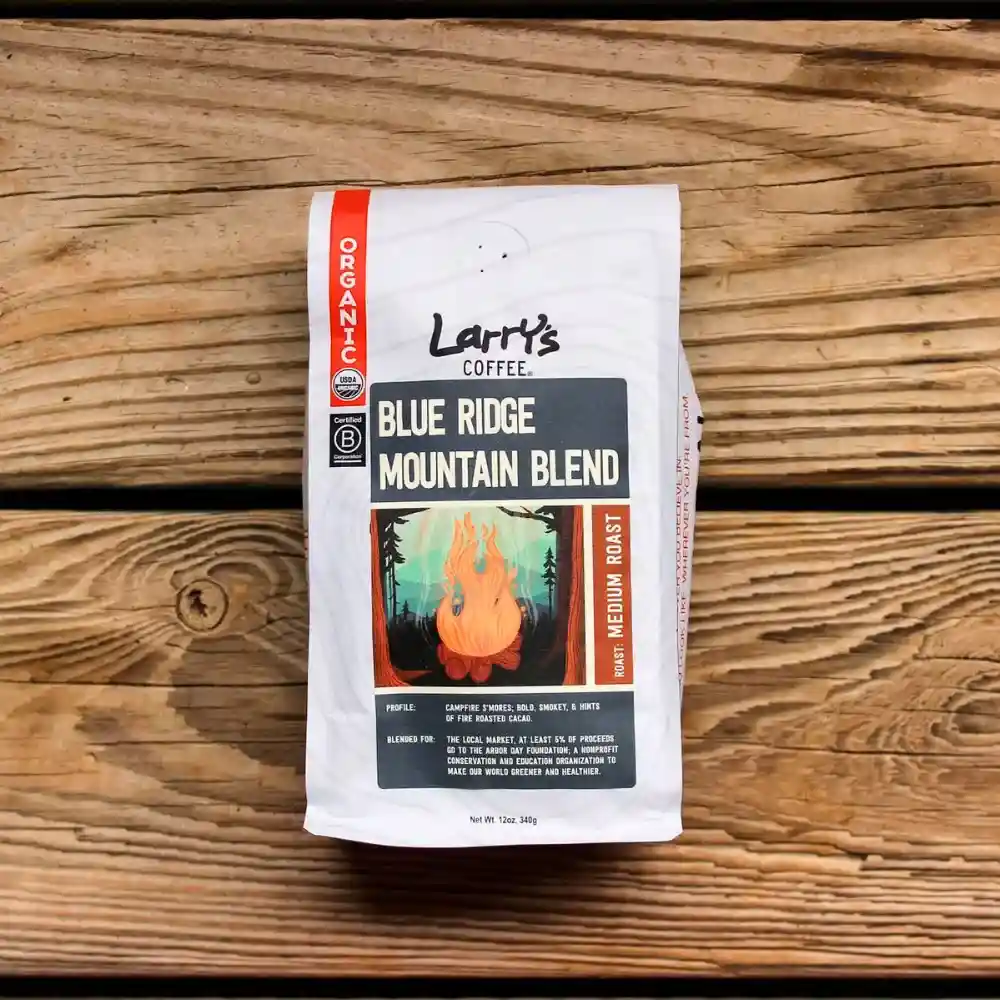
Larry’s Coffee, a socially conscious and environmentally friendly company situated in North Carolina, has been dedicated to championing fair trade and sustainable coffee for almost thirty years. Their entire coffee selection is organic, fair trade, kosher, and shade-grown. Furthermore, they have recently introduced a range of fully recyclable K-cups, showcasing their commitment to environmental responsibility. The company proudly carries the esteemed certification of being a B Corporation and holds a prominent position as one of the founding members of Cooperative Coffees. This distinguished organization consists of a collective of independent coffee roasters who actively engage in direct coffee imports from farmers, forging genuine and equitable partnerships. Larry’s Coffee sources from small farms in about 16 countries worldwide, paying well to sustain small-scale growers and produce the best coffee year after year.
Ethical Bean
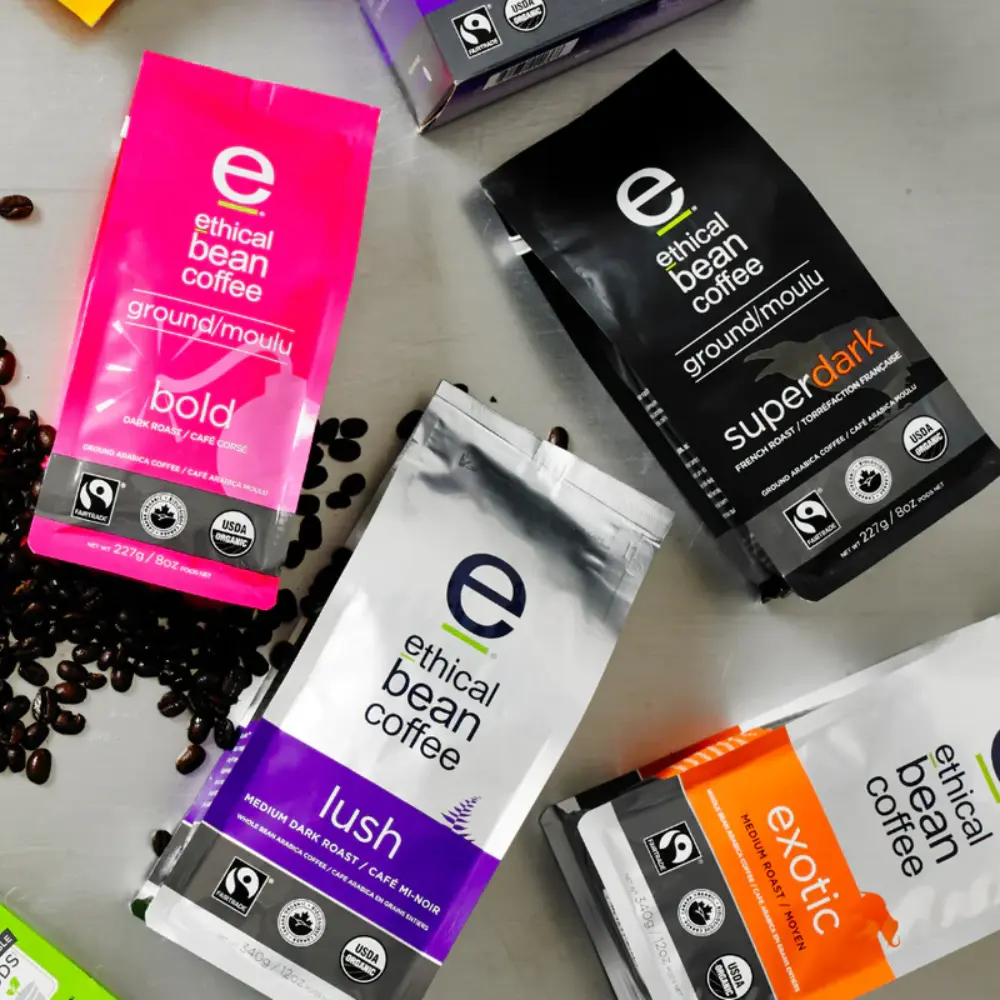
Ethical Bean, a Fair trade Certified and organic coffee brand, is also noteworthy for its sustainable practices. The company roasts its beans in a LEED standard facility using an energy-efficient Smart Roaster. They specifically purchase ‘washed’ or ‘wet processed’ coffees solely from fair trade farmers. These farmers cultivate the beans under naturally shaded canopies, employing farming practices that are devoid of harmful chemicals and synthetic fertilizers. Ethical Bean has joined forces with Bullfrog Power to procure renewable energy for their roastery and vehicle fleet. Additionally, they collaborate with Climate Smart to neutralize any remaining emissions, demonstrating their commitment to sustainability. They were among the pioneers in embracing 100% certified compostable single-serve coffee pods, showcasing their commitment to sustainability and eco-friendly practices.
How These Brands are Making a Difference
These brands are not just selling a product; they are creating a new paradigm for how businesses can operate with integrity and respect for our planet. By adhering to fair trade principles, they ensure that the farmers who toil to produce our beloved beans receive fair compensation for their work. Through their commitment to organic farming practices, they help to reduce the harmful impacts of chemical pesticides and fertilizers on our environment. And by choosing to utilize sustainable packaging solutions, they are helping to reduce the waste generated by the coffee industry.
The Future of Sustainable Coffee Brands
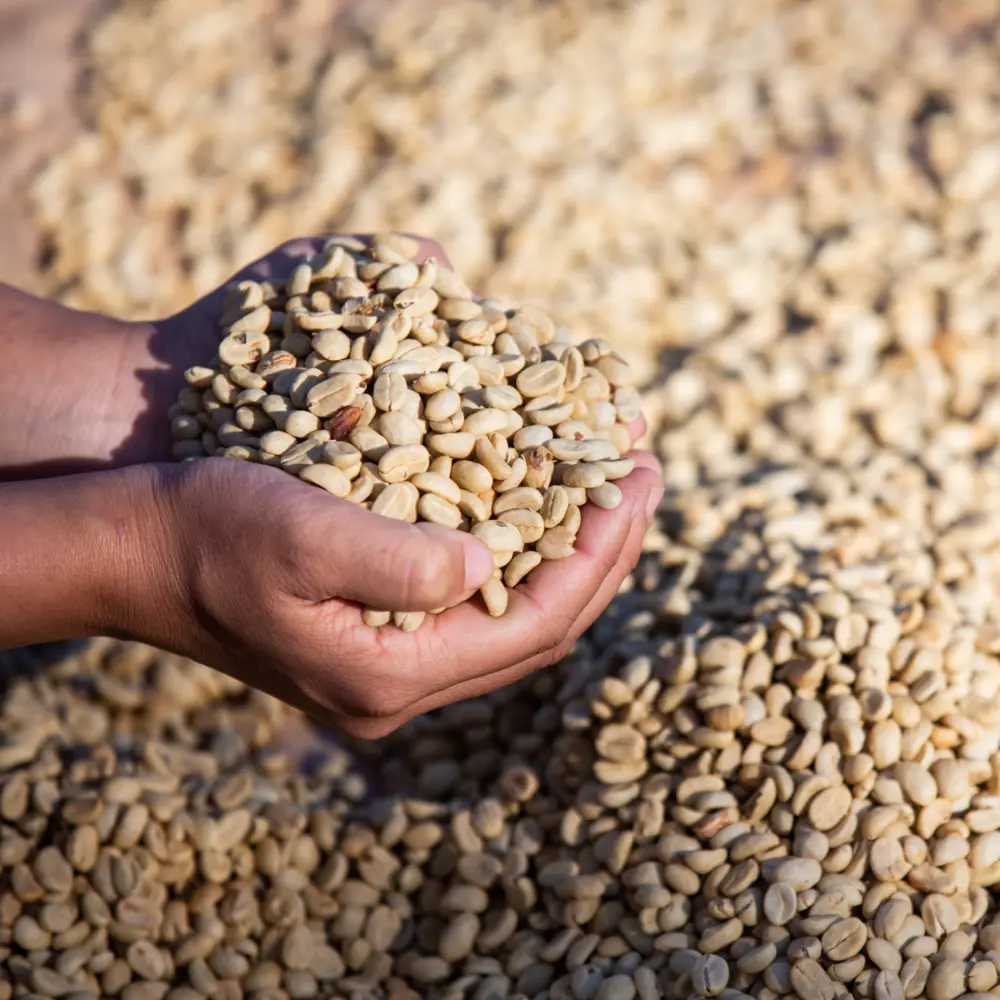
The future looks bright for sustainable coffee brands. As consumers continue to become more aware of the impact of their purchasing decisions on the environment and global communities, the demand for sustainable products is likely to grow. Brands that prioritize ethical practices, environmental responsibility, and fair trade are poised to lead the way in this new era of conscious consumption.
So next time you’re shopping for coffee, consider supporting one of these sustainable brands. Not only will you be able to savor the rich taste of high-quality coffee, but you’ll also know that your choice is helping to make the world a better place. Remember to look for sustainable coffee packaging and certifications to ensure your coffee is truly eco-friendly. The best sustainable coffee brands are those that make a positive impact, from the cultivation of the beans to the packaging of the product.
Brewing and Enjoying Sustainable Coffee at Home
Once you’ve chosen to buy sustainable coffee, the journey doesn’t stop there. The way you brew and enjoy your coffee can also contribute to your eco-friendly lifestyle. From choosing environmentally friendly brewing methods to storing your coffee responsibly and pairing it with sustainable food choices, let’s delve into how you can enhance your coffee experience while keeping sustainability at the forefront.
Eco-Friendly Coffee Brewing Methods

Several brewing methods can minimize your environmental impact while still providing a delicious cup of coffee. Here are a few options:
- French Press: A French press is a manual brewing method that doesn’t require any electricity or paper filters, making it a great eco-friendly option. All you need is coffee, hot water, and a little bit of time.
- Pour Over: Like the French press, the pour-over method is manual and doesn’t require electricity. However, it does typically use a paper filter. To make this method more sustainable, consider using a reusable metal or cloth filter.
- Moka Pot: The Moka pot is a stovetop coffee maker that doesn’t require electricity or filters. It’s a popular brewing method in Europe and is known for producing strong, espresso-like coffee.
- Reusable Pods: If you love the convenience of a single-serve coffee maker, consider switching to reusable pods. These pods can be filled with your choice of coffee and used over and over again, reducing the waste associated with single-use pods.
Tips for Storing Coffee to Maintain Freshness

Proper coffee storage not only maintains the quality and flavor of your beans but can also contribute to sustainability by reducing waste. Here are a few tips:
- Buy Whole Beans: Whole beans stay fresh longer than ground coffee. By grinding your coffee just before brewing, you can prolong its shelf life and reduce waste.
- Store in a Cool, Dark Place: Heat, light, and air can degrade the quality of your coffee. Store your coffee in an airtight container in a cool, dark cupboard or pantry.
- Avoid the Fridge or Freezer: Despite popular belief, storing coffee in the fridge or freezer can harm its flavor. The fluctuating temperatures can cause condensation, which can damage the coffee.
Pairing Coffee with Sustainable Food Choices
To complement your sustainable coffee, consider pairing it with eco-friendly food choices. This could mean opting for locally sourced pastries, choosing organic fruit, or baking your own treats using sustainably produced ingredients. You might also consider exploring plant-based milk alternatives for your coffee, such as almond or oat milk, which typically have a lower environmental impact than dairy milk.

In summary, brewing and enjoying sustainable coffee at home involves more than just the coffee itself. By considering your brewing method, storage techniques, and even your food pairings, you can contribute to a more sustainable coffee culture. Your cup of coffee represents a chain of choices, each with the potential to support a healthier planet.
Conclusion
In conclusion, the journey of sustainable coffee is a multifaceted one, encompassing everything from the cultivation of the beans in the coffee belt to the brewing of the final cup. This comprehensive guide has illustrated that every step along this journey presents an opportunity to make choices that respect our planet and its inhabitants.
We’ve learned about the integral role of fair trade practices in supporting small-scale coffee growers and the significant environmental impact of coffee production. We’ve discovered the numerous benefits of choosing sustainable coffee, from promoting biodiversity to supporting local economies and even enhancing our own health.
Understanding how to identify sustainable coffee is crucial, whether it’s looking for trusted certifications, considering the packaging, or deciphering coffee labels. We’ve also highlighted some of the brands that are making waves in the industry, setting new standards for ethical and environmentally friendly practices.
Brewing and enjoying sustainable coffee at home is the final piece of the puzzle. By choosing eco-friendly brewing methods, storing coffee correctly to maintain its freshness, and pairing your coffee with sustainable food choices, you can enjoy your daily cup knowing that you’re contributing to a better world.
Remember, the power to effect change lies in our hands. Every cup of coffee we drink is a vote for the kind of world we want to live in. By supporting sustainable brands and adopting eco-friendly coffee brewing and consumption habits, we can collectively contribute to a future that values environmental health, fair trade, and the rich, diverse flavors of sustainably grown coffee beans.
Our choices matter. Let’s make them count, one sustainable coffee cup at a time.
FAQ
How does organic farming contribute to sustainable coffee production?
Organic farming supports sustainable coffee production by avoiding the use of synthetic fertilizers and pesticides, which can harm the environment and local biodiversity.
What are some of the most recognized certifications for sustainable coffee?
Some of the most recognized certifications for sustainable coffee include Fair Trade, USDA Organic, Rainforest Alliance, and Bird Friendly.
How can consumers support sustainable coffee practices?
Consumers can support sustainable coffee practices by purchasing coffee that is certified fair trade, organic, or sustainably produced, and by choosing eco-friendly brewing and storage methods.
What are some eco-friendly alternatives to traditional coffee brewing methods?
Eco-friendly alternatives to traditional coffee brewing methods include using a French press, pour-over with a reusable filter, Moka pot, or a single-serve coffee maker with reusable pods.
















